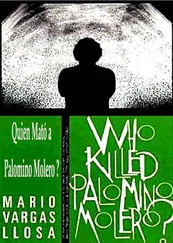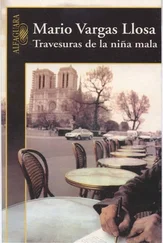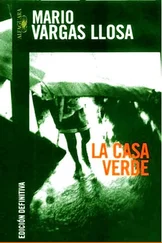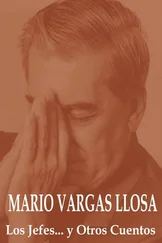This went beyond telepathy. The lieutenant asked the questions using the same words that came to Lituma. “I don’t know,” swore Doña Lupe. “I never heard any names. I only found out that his name was Palomino Molero when I saw the photos in the Piura newspaper. I recognized him right away. My heart broke, sir. That’s him, the kid who ran away with the girl and brought her to Amotape. But I never found out her name or the names of the men who came looking for them. And I don’t want to know, either. Don’t tell me if you know. I’m cooperating, okay? Don’t mention their names!”
“Don’t get upset, stop shouting, don’t say those things,” said the shadow of the old one. “Child, how can you think of threatening me? You’re going to kill yourself, you?”
“If you hurt him, if you touch a hair on his head.” In the sky, behind a bluish haze, the shadows grew darker. The stars had come out. Some candles began to flicker among the adobe walls, cast-iron gates, and bamboo fences of Amotape.
“Hurt him? I’m going to shake hands with him and say to him, from the bottom of my heart, ‘I forgive you,’” murmured the shadow of the old one. He actually did extend his arm toward him, although he was yet to look at him. Doña Lupe began to feel better. She saw they were shaking hands. The boy was so overcome with emotion he could barely speak.
“I swear to you, I’ll do anything, she’s the light of my life, the holiest thing, she…”
“Now you two have to shake hands as well,” ordered the older shadow. “No grudges. No rank here. Just two men, three men, arranging their affairs, the way real men always do things. Happy now, dear? Calmed down? That’s right, it’s all over now. Let’s get out of here.”
He quickly took his wallet out of his back pocket. Doña Lupe felt the sweat-moistened bank notes in her hand and heard a gentlemanly voice thanking her for all her trouble and advising her to forget the whole thing. Then she saw the shadow of the older man walk out of the shack toward the jeep. But the younger shadow poked its pistol in her chest again before leaving: “If you open your mouth, you know what will happen to you. Remember that.”
“And the kid and the girl got into the jeep like two little lambs, just like that? And they just drove off?” The lieutenant couldn’t believe it, judging by the expression on his face. Lituma didn’t believe it either.
“She didn’t want to, she didn’t trust them, and tried to stop him: Let’s stay right here. Don’t believe him, don’t believe him.”
“Come on now, let’s get going, my dear,” the voice of the older one encouraged them from the jeep. “He’s a deserter, don’t forget. He has to go back. This has to be taken care of immediately. This black mark has to be erased from his service record. He’s got to think of his future. Let’s get going.”
“Yes, dear, he’s right, he’s forgiven us, let’s do what he wants and get in. I believe what he says. He wouldn’t lie.”
“He wouldn’t lie.” Lituma felt a tear run down his cheek to his lips. It was salty, a drop of sea water. He kept on hearing Doña Lupe, her voice as deep as the ocean, interrupted from time to time by the lieutenant’s questions. He vaguely understood that she was no longer telling anything she hadn’t already said about the matter they had come to investigate. She cursed her bad luck, she wondered what would happen to her, she asked heaven what sin she’d committed that she should be tangled up in this horrible story. At times she sobbed. But nothing she said interested Lituma.
It was a kind of waking dream, again and again he saw the happy couple enjoying their premarital honeymoon in the humble streets of Amotape: he a half-breed cholo from Castilla; she a white girl of good family. There are no barriers to love, as the old waltz said. In this case the song was correct: love had broken through social and racial prejudices, as well as the economic abyss that separated the two lovers. The love they must have felt for each other had to have been intense, uncontrollable, to make them do what they did. “I’ve never felt a love like that, not even that time I fell in love with Meche, Josefmo’s girl.” No, he’d fallen in love a couple of times, but they were passing fancies that faded if the woman gave in or if she put up such a strong resistance that he finally got bored. But he’d never felt a love so powerful he’d risk his life for it, the kind the kid had felt, the kind that had made the girt stand up to the whole world. “Maybe I’m not the kind who gets to feel real love,” he thought. “Probably it’s because I’ve spent my life chasing whores with the Unstoppables, my heart’s turned whore, and now I can’t love a woman the way the kid did.”
“What am I going to do now, sir?” he heard Doña Lupe implore. “Give me some advice, at least.”
The lieutenant, already standing, asked how much he owed her for the chicha and the stewed kid. When the woman said it was on the house, he insisted. He wasn’t, he said, one of those parasitic cops who abused their power, he paid his own way, on or off duty.
“But at least tell me what I should do now.” She had her palms pressed together as if she were praying. “They’re going to kill me, the way they killed that poor kid. Don’t you see that? I don’t know where to go. I have no place to go. Didn’t I cooperate the way you asked? Tell me what I should do now.”
“Just stay quiet, Doña Lupe.” The lieutenant put the money for the meal next to the chicha gourd. “No one’s going to kill you. No one will even bother you. Just go on living your normal life and forget what you saw, what you heard, and what you told us. Take it easy, now.” He nicked the visor of his cap with his fingers, his usual way of saying goodbye. Lituma got up quickly and followed him out, forgetting to bid Doña Lupe farewell.
Walking out into the open air and receiving the vertical sun full blast without the protection of the woven mats and bamboo poles was like walking into hell. Within a few seconds, he felt his khaki shirt soaked and his head throbbing. Lieutenant Silva was stepping along smartly, while Lituma’s boots were sinking into the sand, making each step an effort. They walked up the winding main street of Amotape toward the open land and the highway.
As they walked along, Lituma glimpsed the clusters of human eyes behind the bamboo walls of the shacks, Doña Lupe’s curious, nervous neighbors. When he and the lieutenant arrived, they’d all hidden, because they were frightened of the police. As soon as they were out of sight, Lituma was sure they’d all run over to Doña Lupe’s cabin to ask what happened, what the cops had seen and said. Lituma and the lieutenant walked in silence, each deep in his own thoughts.
As they were passing the last houses, a mangy dog ran out to snarl at them. When they reached the sandy ground, darting lizards appeared and disappeared among the rocks. Lituma thought there were probably foxes as well as lizards. The kids had probably heard them howling during the two days they’d found refuge in Amotape. The foxes probably came in at night to prowl around the corrals where the goats and chickens were kept. Would the girl have been frightened when she heard the howling? Would she have hugged him close, trembling, seeking protection? Would he have calmed her down whispering sweet words into her ear? Or would they have been so in love that they would be oblivious, so absorbed in each other that they wouldn’t even hear the noises of the world? Had they made love for the first time in Amotape? Or had they done it among the sand dunes surrounding the Piura Air Force Base?
When they reached the edge of the highway, Lituma was soaked from head to foot, as if he’d jumped fully clothed into a stream. He saw that Lieutenant Silva’s green trousers and cream-colored shirt also had large dark patches and that his forehead was covered with beads of sweat. There wasn’t a vehicle of any kind in sight. The lieutenant shrugged his shoulders in a gesture of resignation: “We’ll have to be patient.” He took out a pack of Incas, offered a cigarette to Lituma, and lit one for himself. For a while they smoked in silence, baking in the heat, thinking, observing the mirage of lakes, fountains, and seas out in front of them on the endless sand. The first truck that passed going toward Talara didn’t stop, despite the frantic gestures both made with their hats.
Читать дальше











